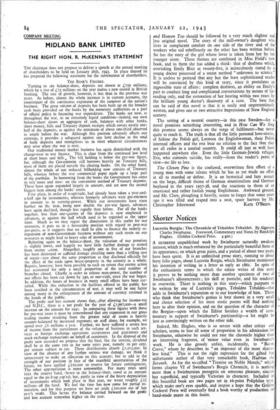Shorter Notices
Lucretia Borgia : The Chronicle of Tebaldeo Tebaldef. By Algernon Charles Swinburne. Foreword, Commentary and Notes.by Randolph Hughes. (Golden Cockerel Press. 4 gns.)
A HITHERTO unpublished work by Swinburne naturally awakens interest, which is much enhanced by the particularly beautiful form of its appearance, on which great pains, and a period of about two years, have been spent. It is an unfinished prose story, running to about forty folio pages, about Lucretia Borgia, which Swinburne mentioned his intention of writing in a letter as early as 1861. In spite of the enthusiastic terms in which the editor writes of this story it proves to be nothing more than another specimen of two of Swinburne's idiosyncrasies ; his skill at pastiche, and his tendency to overwrite. There is nothing in this story—which purports to be written by one of Lucretia's pages, Tebaldeo Tebaldei—that adds to Swinbume's reputation or to our knowledge of him. Those who think that Swinburne's genius is best shown in a very small and choice selection of his most erotic poems will find nothing here to alter their opinion, and on the question of the character of the Borgias—upon which the Editor lavishes a wealth of com- mentary in support of Swinburne's partisanship—a lot might be just as convincingly written on the other side.
Indeed, Mr. Hughes, who is so severe with other critics and scholars, seems to lose all sense of proportion in his admiration for Swinburne, otherwise he could not rate the chronicle higher than an interesting fragment, of 'minor value even in Swinburne's work. He is also grossly unfair, incidentally, to " Baron Corvo," whom he describes as " an impostor of the most shame- less kind." This is not the right expression for the gifted but unfortunate author of that very remarkable book, Hadrian the Seventh. As for the so-called "Treatise on Noble Morals," which forms chapter VI of Swinburne's Borgia Chronicle, it is nothing more than a Swinbumian panegyric on sensuous pleasure, sincere but superficial, and typically Victorian in character. Included in this beautiful book are two pages set in 16-point Poliphilus tyre, which make one's eyes sparkle, and inspire a hope that the Golden Cockerel Press will eventually find a book worthy of production on hand-made paper in this fount.


























 Previous page
Previous page